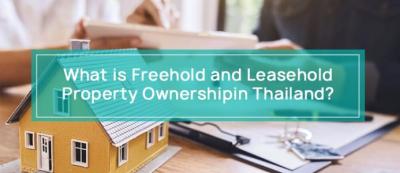Thailand property Freehold versus Leasehold

The different types of property rights in Thailand.
Ownership is an essential point for those wishing to invest in real estate. In Thailand, there are 2 main types of land ownership: Leasehold and Freehold. Each type offers distinct advantages and disadvantages that potential buyers should carefully care. This resume aims to explore the ownership types of properties in Thailand, focusing on leasehold and freehold ownership, to highlight the plus and minus associated with each type.
Leasehold property:
Leasehold ownership in Thailand grants an individual the right to use and occupy a property for a specified period, usually 30 years, with the option of extending the lease contact 2 times, 90 years at least. Although leasehold properties were initially intended for foreigners, they are now also available to Thai nationals.
Benefits:
Lower initial investment: Leasehold properties often require a lower initial investment than freehold properties. This affordable price makes it an attractive option, especially for buyers looking to establish a temporary residence or business venture.
Flexibility: Lease agreements can be negotiated and tailored to meet specific needs. Tenants have the flexibility to negotiate lease terms, including term and conditions, allowing for greater adaptability.
Reduced maintenance costs: In many cases, rental agreements place the responsibility for maintaining the property on the landlord or lessor. This relieves tenants of the financial burden associated with repairs, renovations and general maintenance.
Disadvantages:
Limited Control: Leasers have limited control over the property, as ownership remains with the lessor. This lack of control can hamper long-term planning and investment decisions.
Uncertainty: The expiry of a lease can introduce uncertainty, especially if the lessor decides not to renew or if the property is sold. This uncertainty presents a risk to tenants who have invested time and resources in developing the property.
Decrease in value: As the lease term approaches its expiration, the value of the realty may decrease, potentially making it more difficult to sell or negotiate favorable terms for extending the lease.
Freehold Ownership:
Freehold ownership, also known as "Chanote" title, gives the owner full and permanent ownership. It provides the owner with the right to use, sell, lease, or inherit the property. Freehold ownership is generally considered more secure and valuable than leasehold ownership, as it grants long-term ownership rights without the risk of the property reverting to the landowner after a specific lease period. Freehold in Thailand grants individuals complete and unlimited ownership rights to a property. This type of property is generally only available to Thai nationals, with some exceptions for foreign investors and condominium unit buyers following quota rule
Benefits:
Freehold ownership provides individuals with the highest level of control and security. Owners have the freedom to use, modify, rent or sell the property as they want, providing long term stability and investment opportunities.
Increase in property value: Freehold properties often increase in value over time, providing owners with the opportunity for a significant return on investment.
Increased Borrowing Capacity: Owning a freehold property can improve an individual's borrowing capacity as it can serve as collateral for securing loans from financial institutions.
Disadvantages:
Higher initial costs: Freehold properties generally require a higher initial investment than leasehold properties. This may limit access for individuals or businesses with budget constraints.
Maintenance Responsibility: As freehold owners, individuals are solely responsible for the maintenance of the property, including repairs, renovations and other associated costs.
Limited Foreign Ownership: Foreign individuals or companies face restrictions on freehold ownership in Thailand. They can only acquire freehold properties under specific circumstances, such as through promotion from the Board of Investment (BOI) or by meeting certain criteria under the Condominium Act.
When considering property ownership types in Thailand, buyers should carefully assess their needs, goals and budget. Leasehold properties offer flexibility and affordability, but come with limited control and uncertainty. On the other hand, freehold properties offer greater control, long-term stability, and potential returns on investment, but come with higher upfront costs and restrictions for foreign ownership.